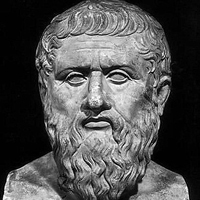Republic by Plato: Introduction
Plato is the first major figure in the history of western philosophy. He is an idealist, a moralist and a rationalist. He locates reality in what he calls "ideas" or "forms" rather than the world of appearance that we locate with our senses. In other words, he believes in mind or reason and further divides this world into- ideal and real world.

Plato (427-347 BC)
The ideal world is the world where ideas exist, but the world of appearance is unreal, false and illusory. Plato believes in the idea that is “form” which itself is formless but it is fixed. Idea is an archetype and always remains the same. For example: though there are different size of ripe apples- such difference in size is only the appearance so it is unreal. But ‘sweetness’ of all apples is the same; it is reality, quality and idea. Reality cannot be found in the world of appearance, but in the ideal world. Plato thus is a dualist who believes in two realities-sensory world of appearance and ideal world of idea.
The world that we perceive around us is the world of imitation or shadow of the idea or ideal world. When a poet imitates this world, his creation, obviously is twice removed from reality. Poets do not use their own rationality; they are inspired by the divine inspiration, so they are only forced to use their emotion. Further, more Plato stressed that the poets possess the madness and are not in control of themselves when they write. Poet’s creation caters (feeds) to the emotion and passion, making people cowardice which ultimately will disrupt the order of the Republic. Literature for Plato is acceptable only if they produce courage, loves of goodness, faith, justice etc. But Homer has presented hatred, jealousy and lust, which exploit the readers, rendering them towards corruption and the coward.
For Plato, poets are away from using their reason, whereas philosophers use their reason to get the truth so they are closer to reality. For Plato, art is an imitation of the world of phenomena which itself is an imitation of the world of Idea. Thus, it is an imitation of an imitation of what is already a photocopy. As he locates reality in the world of idea Plato says that art/ artist is twice removed from reality. Moreover, for Plato artist is suspended from reason, or conceivably possessed by madness or not in the control of himself. Plato considers them dangerous to society and talks of poet’s banishment from his ideal republic.
Poets, according to Plato cannot be good teachers. The fault with them is that they attribute human qualities, behaviors and follies to gods and goddesses. In this way, they spot the unspotted essence of the gods and thus threaten the well- being of a state by promoting disbelief in the Supreme Being of god. Thus Plato proposes a ban on the artist.
Through Plato, separating form and content of poetry, emphasizes much on content or on the didactic and moral purposes, he does not totally dismiss the significance of poetry. His treatment towards the content of the poetry is like as Aristotle, when he says poetry should imitate the model virtue and noble action.
Plato’s philosophy cause death to literature and this philosophy make Aristotle stand against him. If Plato’s disciple would not have stood against the position of Plato, literature, art, poetry would have been died a thousand years before.
Browse by Question
Reading on Republic
Position of Poets in Plato's Ideal State
Plato's view compared to Aristotle and Shelley
 |
bachelorandmaster.com |